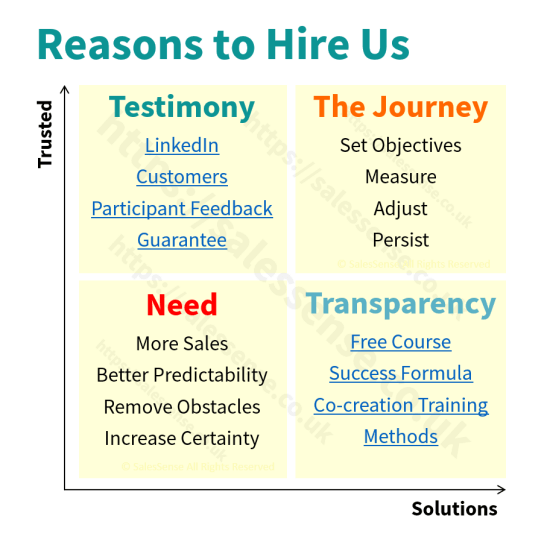Increase retention, standing, and business through a key account management training course.

Protect high-value repeat business from important customers. Take this Key Account Management training course to elevate standing, strengthen relationships, and maximise major account sales.
What is the best key account management training course?
- A course based on commonly held best practices for key account management. A list is appended below.
- Having access to the course content in advance of the sessions.
- Spending session time creating implementation plans and practising execution.
- Training that facilitates the creation of a consistent process.
- The creation of workplace actions for embedding learning in routines and habits.
- Sessions led by the course author.
- The opportunity for one-to-one learning.
- Results are guaranteed.
When the loss of one or two major customers could threaten survival, key account management becomes a critical function.
Key Account Managers must do more than provide good service. They must establish regular communication with those who make executive decisions, as well as the people who use what is sold. They must become part of the customer's success.
In addition to establishing trusted advisor status with senior executives, key account managers must develop and maintain a perception of strategic value. Otherwise, sooner or later the business will be lost to a competitor or eliminated by an unexpected executive decision.
What are the Key Account Management Course learning objectives?
- Extend understanding of the customer's business.
- Establish trusted advisor status with customer executives.
- Understand customer politics and organisational dynamics.
- Learn to predict organisational change.
- Expand relationships across divisional and departmental boundaries.
- Improve team communication and reduce or eliminate mistakes.
- Establish or develop strategic partner status.
- Increase certainty and forecast accuracy.
- Maximise share of mind, sales revenue, and profit.
- Anticipate and counter the efforts of competitors.
- Reduce sales cycle times.
Key Account Management training helps account managers maximise sales opportunities and protect the business from competitors.
Throughout the course, participants apply principles and methods to real account situations and develop a unique account plan that guides the ongoing use of learning in the workplace.
Learn new ways to maximise customer benefits, address all the possible business, keep competitors out, and gather invaluable feedback. Establish personal status as a trusted advisor and organisation status as that of a strategic partner in important customer accounts.
What is in the course?
Introduction: Goals, objectives, and learning management.
Essential Knowledge: Understanding the customer's business.
Executive Perspective: Inside the minds of leaders and policymakers.
Relationship Status: Mapping relationships and relationship objectives.
Trusted Advisor: How to know if you are one and become one if you are not.
Strategic Partner Status: How to know if you have it and get it if you haven't.
Organisational Politics: What it is and why you must take it into account.
Using the Tools: Mapping power and relationships in a real customer.
Internal Referrals: Crossing departmental and functional boundaries.
Establishing Periodic Meetings: Operational reviews and strategic enquiries.
Competitive Strategy: How to anticipate and defeat the plans of competitors.
Using the Tools: Learning to select and test competitive strategy.
Quantified Qualification: Will it happen, can you win, will it be worthwhile?
The Black Hole: How to ensure continued communication after submitting a proposal.
Efficient Account Plans: Assembling and maintaining account plans.
Review and Next Steps: How to transform learning into results
Who should attend?
Experienced key account managers (also referred to as global account managers, strategic account managers, and major account managers) and people in their support teams. Others who regularly participate in key account sales including line managers, bid team members, marketing, and technical staff. This course is suitable for large account management training and global account management training.
Additional Benefits
- Flexible multi-session 'learning by doing' training options.
- Workplace assignments that develop new habits and practices.
- Tools, templates, frameworks, and examples that save time and aid learning.
- Adopting a common language improves communication and teamwork.
- Training increases the adoption of best practices, habits and methods.
- Training increases sales productivity, consistency, and results.
- Professional development improves job satisfaction and motivation.
- Increasing know-how and expertise reduces staff turnover.
Key Account Management Course Delivery Options
- One-to-one delivery through eight 2-hour or sixteen 1-hour sessions.
- £1595 - Learn more.
- One-to-one on a per-session basis.
- £150 - Learn more.
- Group training via eight 2-hour or sixteen 1-hour virtual classroom sessions.
- £6320 for up to fifteen people. Learn more.
- Group training on a per-session basis to address selected content.
- £450 per 1-hour session for up to fifteen people. Learn more.
- Fees exclude applicable VAT.
- Traditional Classroom - The programme delivery takes place over one or more days at a conference venue or at the customer's offices. Contact us for fees.
Use this link for more information or to have us call you.
What are the best practices for key account management?
Key account management (KAM) is a strategic approach that focuses on building long-term, value-driven relationships with the most important customers or clients of a business. Best practices for effective key account management include the following:
1. Customer-Centric Approach
Understand the client’s business: Learn about your key account’s industry, challenges, goals, and market position. This helps tailor solutions to meet their specific needs.
Value creation: Focus on providing long-term value rather than short-term gains. This involves understanding the client’s strategic objectives and offering solutions that enhance their competitive advantage.
Regular communication: Maintain open, proactive, and transparent communication. This strengthens trust and allows you to stay informed about changes in their business or industry.
2. Dedicated Account Teams
Specialised teams: Assign a dedicated account manager or a team to the key account. This ensures the client receives personalised attention and service.
Cross-functional collaboration: Involve various departments (e.g., sales, marketing, product development) to address the client’s needs holistically and efficiently.
3. Strategic Planning
Long-term relationship planning: Develop a long-term relationship strategy that aligns with both your company’s and the client’s objectives. Set mutual goals and milestones for the partnership.
Account plans: Create detailed account plans that outline the client’s business strategy, key stakeholders, decision-making processes, and potential growth opportunities.
4. Relationship Building
Build multi-level relationships: Engage with key decision-makers, influencers, and stakeholders across the client’s organisation. This deepens the relationship and reduces reliance on individual contacts.
Trust and loyalty: Foster trust by consistently delivering on promises and being a reliable partner. This helps in turning key accounts into long-term loyal clients.
5. Value-Based Selling
Consultative approach: Shift from traditional selling to a consultative role where you help solve your client’s problems. Offer insights and advice, becoming a trusted advisor rather than just a vendor.
Customisation: Tailor products and services to the specific needs of the key account. This ensures that the solutions are highly relevant to the client’s challenges and goals.
6. Regular Performance Reviews
Account performance metrics: Establish clear KPIs to measure success, such as revenue growth, client satisfaction, and solution adoption.
Periodic reviews: Conduct regular reviews with the client to assess the status of the relationship, progress towards goals, and areas for improvement.
7. Proactive Problem Solving
Identify risks early: Stay ahead of potential issues by monitoring changes in the client’s industry, business model, or market trends. Proactively address these issues before they escalate.
Continuous improvement: Always seek ways to improve the client’s experience and value received. This could involve introducing new products, services, or process improvements.
8. Leverage Technology
CRM systems: Use robust customer relationship management (CRM) tools to track interactions, sales opportunities, and account history.
Data-driven insights: Utilise data and analytics to gain deeper insights into the key account’s preferences, behaviours, and emerging needs.
9. Adaptability
Flexibility: Be prepared to adapt strategies and approaches as the client’s business or market conditions evolve.
Innovative solutions: Keep up with industry trends and innovations to provide your key accounts with forward-thinking solutions that address their changing needs.
10. Mutual Benefit
Shared goals: Align your company’s objectives with those of the key account. The relationship should be mutually beneficial, where both parties grow and succeed together.
Joint business development: Explore opportunities to collaborate on new business ventures, product development, or market expansion.
These best practices help ensure that key account management is effective, fostering strong, long-lasting relationships that benefit both the business and the client. For a deeper dive, frameworks, tools, and development join our course.
Related Account Management Resources
Large Account Management Training: Skills and tools for managing national and international customer accounts. Large account management training for key account managers and directors. Details.
Account Management: Turn customers into business partners. A training course for new and inexperienced account managers. Details.
Accelerate Sales through Partners: Suitable for channel account managers and those responsible for selling via third parties including agents, resellers, distributors, and alliances. Details.
Large Numbers
Licensing and train-the-trainer options enable the self-delivery of our key account management training course. To find out more, call or use the links below. Associate and Affiliate representation is welcomed. To promote or deliver this course, get in touch directly.
Want something different?
Please ask:
If you are looking for a key account management training course or need to protect major account business, get in touch. Telephone +44 (0)1392 851500. Alternatively, use the contact form here or email custserv@salessense.co.uk.






















